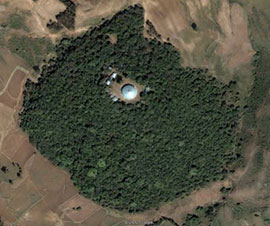
Researchers investigate the ecological impact of cultural and religious stewardship on sacred forests.
Two interdisciplinary science research projects featuring collaborations among diverse faculty from Colgate and around the world will move forward with grants from the Picker Interdisciplinary Science Institute at Colgate.
The projects support the core mission of the institute, which aims to foster the creation of new knowledge that is obtainable only through the development of sustained interdisciplinary research.
Colgate physics and astronomy professors Rebecca Metzler and Kiko Galvez received a two-year award for their project “Probing Biomineral Formation through Novel Laser Imaging Polarimetry.”
The project will combine the physical optics involved in diagnosing complex light forms with the biophysical research of the biomineral surfaces made by various mollusk species. The colorful inner surfaces of mollusk shells are an example of biominerals produced by living organisms.
The researchers and their students intend to obtain information about the unique composition and structure of the shells by studying the polarization of the iridescent light they reflect in order to learn more about their physical properties.
“Rebecca and Kiko are each bringing very different approaches and perspectives to this very creative collaboration, and together they will develop exciting new ways of visualizing and understanding complex biological materials,” explained Damhnait McHugh, director of the institute.
In addition, Colgate faculty members Catherine Cardelús (biology), Eliza Kent (religion), and Peter Klepeis and Peter Scull (geography) received a one-year award for their project “Does religious management mitigate the socio-ecological drivers of forest change in sacred groves of northern Ethiopia?”
They will collaborate on the project with Margaret Lowman (North Carolina Museum of Natural Sciences and North Carolina State University) and Alemayehu Wassie Eshete (Bahir Dar University, Ethiopia) to assess whether and how cultural and religious stewardship of “sacred forests” in Ethiopia reduces negative impacts on these compromised ecosystems.
“This team represents an exciting collaboration across many disciplines. The depth of understanding to be gained by their collaborative approach is immense,” said McHugh. “Coupled with close connections with the people most invested in the sacred forests, this work can have a powerful impact on the fate of these unique habitats.”
Learn more about the institute and this year’s supported projects on the Picker Interdisciplinary Science Institute website.